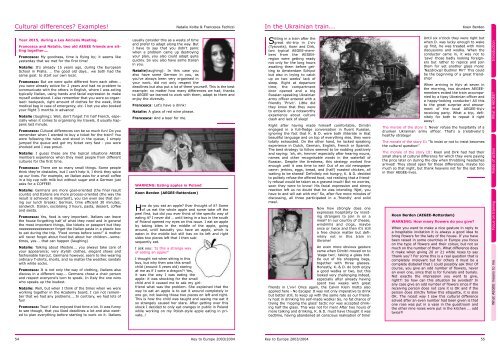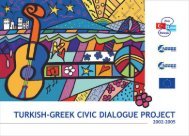Key 2003/2004 - AEGEE Europe
Key 2003/2004 - AEGEE Europe
Key 2003/2004 - AEGEE Europe
Create successful ePaper yourself
Turn your PDF publications into a flip-book with our unique Google optimized e-Paper software.
Cultural differences? Examples!Natalie Kolbe & Francesca FedrizziIn the Ukrainian train...Koen BerdenYear 2015, during a Les Anciens Meeting.Francesca and Natalie, two old <strong>AEGEE</strong> friends are sittingtogether….Francesca: My goodness, time is flying by; it seems likeyesterday that we met for the first time!Natalie: It’s already 15 years ago, during the <strong>Europe</strong>anSchool in Praha. … the good old days… we both had thesame goal: to start our own local.Francesca: But we were quite different from each other...you were already active for 2 years and had no problem tocommunicate with the others in English, where I was actingtypically Italian, using hands and facial expression to makemyself understood. I also remember that you were so organised:backpack, right amount of clothes for the week, littlemedical bag in case of emergency, etc. I bet you also bookedyour flight 3 months in advance!Natalie (laughing): Well, don't forget I'm half French, especiallywhen it comes to organising my travels, it usually happenslast minute.Francesca: Cultural differences can be so much fun! Do youremember when I wanted to buy a ticket for the train? Youwere following the rules and stood in the queue, I simplyjumped the queue and got my ticket very fast - you wereshocked and I was proud.Natalie: I guess these are the typical situations <strong>AEGEE</strong>members experience when they meet people from differentcultures for the first time.Francesca: There are so many small things. Some peoplethink they’re obstacles, but I can’t help it, I think they spiceup our lives. For example, an Italian asks for a small coffeein a big cup with milk but without sugar and a German justasks for a COFFEE!Natalie: Germans are more goal-oriented (the final resultcounts) and Italians are more process-oriented (the way theresult is achieved is important), you can even see that duringour lunch breaks: German, time efficient 30 minutes,sandwich. Italian, socialising 3 hours, pasta, dessert, coffeeand siesta.Francesca: Yes, food is very important. Italians can leavethe house forgetting half of what they need and in generalthe most important things, like tickets or passport but theyneeeeeeeeeeeeeever forget the Italian pasta in a plastic boxto eat during the trip. "Food comes before sons!" A motherwill never forget about food but about her children...sometimes,yes…. that can happen (laughing)Natalie: Talking about lifestyle…. you always take care ofyour appearance; very stylish clothes, elegant shoes andfashionable haircut. Germans however, seem to like wearingordinary T-shirts, shorts, and no matter the weather, sandalswith white socks.Francesca: It is not only the way of clothing, Italians alsodiscuss in a different way…. Germans chose a chair personand respect everyone's turn to speak. In Italy the one winswho speaks up the loudest.Natalie: Well, but when I think of the times when we wereworking together in the Academy board, I can not rememberthat we had any problems…. In contrary, we had lots offun!Francesca: True! I also enjoyed that time a lot. It was funnyto see though, that you liked deadlines a lot and also wantedto plan everything before starting to work on it. Italiansusually consider this as a waste of timeand prefer to adapt along the way. ButI have to say that you didn't panicwhen a problem came up destroyingyour plan, you also could adapt quitequickly. So you also have some Italianin you.Natalie(laughing): In this case youalso have some German in you, asyou've always been very organised inyour work, did not only respect thedeadlines but also put a lot of them yourself. This is the bestexample: no matter how many differences we had, thanksto <strong>AEGEE</strong> we learned to work with them, adapt to them andenjoy the diversity.Francesca: Let's have a drink!Natalie: A glass of red wine please.Francesca: And a beer for me.WARNING: Eating apples in PolandKoen Berden (<strong>AEGEE</strong>-Rotterdam)ow do you eat an apple? Ever thought of it? SomeHof us eat the whole apple and some take off thepeel first, but did you ever think of the specific way ofeating it? I never did … until being in a bus in the southof Poland opened my eyes on this issue. I eat an appleby taking bites in the middle of the apple, goingaround, until basically you have an apple, which iseaten in the middle but still has on its left and rightsides two pieces left that I then subsequentlyeat.I ask you: 'Is this a strange wayof eating an apple?'I thought not when sitting in thisbus, but why then was this smallchild (around 5 years old) staringat me as if I were a dragon?! Yes,it was the way I was eating theapple: it was shocking for the smallchild and it caused me to ask my girlfriendwhat was the problem. She explained that theway to eat an apple is to eat it around completely inone go, not leaving those two pieces on left and right.This is how the child was taught and seeing me eat itso strangely caused her stare. After getting over thisshock I decided to only eat oranges in public in Polandwhile working on my Polish-style apple eating in private…!itting in a train after theSgreat ski-trip in L'viv(Tysovets), Koen and Dirk,two typical <strong>AEGEE</strong>-membersfrom the WISENregionwere getting readynot only for the long hoursawaiting them before gettingto Amsterdam Schipolbut also in trying to catchup on two weeks’ lack ofsleep. Right at departuretime, the compartmentdoor opened and a bigRussian-speaking Ukrainianarmy officer entered with afriendly 'Privit'. Little didthey know that they wereto embark on a noteworthyexperience about cultureclash and lack of sleep!Right after having made himself comfortable, Dimitriengaged in a full-fledge conversation in fluent Russian,ignoring the fact that K. & D. were both illiterate in thatbeautiful language and on top of everything else, they weretotally exhausted. On the other hand, he lacked speakingexperience in Dutch, German, English, French or Spanish.The best strategy to follow seemed to be nodding positivelyand saying: 'ah, eh, hmmm' especially after hearing nouns,names and other recognisable words in the waterfall ofRussian. Despite the tiredness, this strategy worked fineenough until it was time to eat! Out of an old newspapercame: jerkins, eggs, bread, and (half) roasted chicken, allwaiting to be shared! Definitely not hungry, K. & D. decidedto politely refuse the offered food, not realising that a friendlyrefusal would be taken as a gravest insult! But no worries,soon they were to know! His facial expression and strongreaction left us no doubt that he was intending 'Njet, youhave to and will eat with me!' So, after five more minutes ofdiscussing, all three participated in a 'friendly' and solidmeal.Now how strongly does oneexpresses hospitality by insistingstrangers to join in on ameal? In our country of cheese,windmills and clogs, maybeonce or twice and then it's stilla free choice matter but definitelynot in this train inUkraine!An even more obvious gesturecame when Dimitri moved on to'stage two', taking a glass bottleout of his shopping bags,together with three glasses.Honestly, K. & D. do both enjoya good wodka or two, but thislooked very challenging indeed,especially after already havingspent two weeks with greatfriends in L'viv! Once again, the Calvin Klein motto alsoapplied here - No Escape! It was not only imperative to drinkbut better still, to keep up with the same rate as our friendlyhost in drinking his self-made wodka! So, no fat chance oftrying the 'nipping the glass' tactic nor was accepted drinkinghalf the glass. This was not for men! After two hours ofmore talking and drinking, K. & D. must have thought it wasbedtime, having abandoned all conscious realisation of time!Until six o'clock they were right butwhen D. was lucky enough to wakeup first, he was treated with morediscussions and wodka. When theconductor came in, it was not to'save' those badly looking foreignersbut rather to rejoice and jointhem for yet another glass more!'Nazdrovje! Budmo! Mir!' This couldbe the beginning of a great friendship!When arriving in Kyiv at seven inthe morning, two drunken <strong>AEGEE</strong>membersexited the train accompaniedby a tipsy Ukrainian officer anda happy-looking conductor! All thisto the great surprise and amusementof the local <strong>AEGEE</strong>-Kyivreceiving party. What a trip, definitelyfor both to repeat it rightaway!The morale of the story I: Never refuse the hospitality of adrunken Ukrainian army officer. That's a (relatively!!)healthy strategy!The morale of the story II: 'To insist or not to insist becomesthe cultural question!'The morale of the story III: Koen and Dirk had had theirsmall share of cultural difference for which they were payingthe price later on during the day when throbbing headachesarrived! They stood open for these differences, maybe toomuch so that night, but thank heavens not for the last timein their <strong>AEGEE</strong>-lives.Koen Berden (<strong>AEGEE</strong>-Rotterdam)WARNING: How many flowers do you give?When you want to make a nice gesture in reply toa hospitable invitation it is always a good idea tobring flowers for the lady of the house. If you havebeen raised in some countries in <strong>Europe</strong> you focuson the type of flowers and their colour, but not somuch on the number of them. What difference doesit make when giving 20 or 21 white roses to say'thank you'? For some this is a real question that iscompletely irrelevant but for others it must be acomplete disbelief that I could possibly ask this! Ofcourse, you give an odd number of flowers, neveran even one, since that is for funerals and burials.Not exactly the impression you want to give,right?! So how can this situation be avoided? Inany case give an odd number of flowers since if thereceiving person does not care it is OK and if theperson does strictly follow this etiquette, it is alsoOK. The nicest way I saw this cultural differencesolved after an even number had been given is thatone rose was put in a vase in the guestroom andthe other nine roses were put in the kitchen ... oddtwice?!What <strong>AEGEE</strong> means to me Focus on training Fields of action What is <strong>AEGEE</strong>? Introduction54 <strong>Key</strong> to <strong>Europe</strong> <strong>2003</strong>/<strong>2004</strong><strong>Key</strong> to <strong>Europe</strong> <strong>2003</strong>/<strong>2004</strong>55







